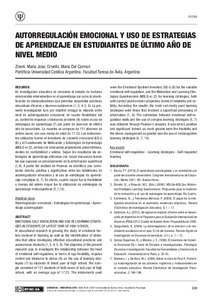Por favor, use este identificador para citar o enlazar este ítem:
https://repositorio.uca.edu.ar/handle/123456789/15822| Título: | Autorregulación emocional y uso de estrategias de aprendizaje en estudiantes de último año de nivel medio Emotional self-regulation and use of learning strategies in students of latest year of high school |
Autor: | Zinoni, María José Crivello, María del Carmen |
Palabras clave: | EMOCIONES; APRENDIZAJE; ESTRATEGIAS DE APRENDIZAJE | Fecha de publicación: | 2019 | Editorial: | Universidad de Buenos Aires. Facultad de Psicología | Cita: | Zinoni, M.J., Crivello, M.C. Autorregulación emocional y uso de estrategias de aprendizaje en estudiantes de último año de nivel medio [en línea]. En: XI Congreso Internacional de Investigación y Práctica Profesional en Psicología. XXVI Jornadas de Investigación. XV Encuentro de Investigadores en Psicología del MERCOSUR. I Encuentro de Investigación de Terapia Ocupacional. I Encuentro de Musicoterapia. 27 al 29 de noviembre. Buenos Aires: Universidad de Buenos Aires. Facultad de Psicología y Psicopedagogía, 2019 Disponible en: https://repositorio.uca.edu.ar/handle/123456789/15822 | Resumen: | Resumen: En investigación educativa es creciente el estudio de factores
emocionales intervinientes en el aprendizaje así como la identificación de obstaculizadores que permitan desarrollar prácticas
educativas eficaces y alumnos autónomos (1, 3, 4, 5, 8). La presente investigación tuvo por objetivo indagar la relación entre
nivel de autorregulación emocional, en cuanto flexibilidad del
yo, control de impulsos y tolerancia al estrés (9), sobre el uso de
estrategias de aprendizaje (7) por parte de alumnos de último
año de secundario. La muestra se compuso de 151 alumnos de
ambos sexos, con una media de edad de 17.23. Los instrumentos utilizados fueron el Inventario de cociente emocional (EQ-i)
(6) y el Cuestionario de Motivación y Estrategias de Aprendizaje
(MSLQ-e) (2), ambos con adecuadas propiedades psicométricas,
niveles de confiabilidad y validez. Según los resultados las estrategias de aprendizaje utilizadas con mayor frecuencia fueron
las que suponen un procesamiento de la información superficial
(1,9). A partir del análisis de Pearson se identificó una correlación directa, positiva y significativa entre las habilidades de
autorregulación emocional y el uso de estrategias de aprendizaje complejas (5, 7). En efecto, cuanto mayor fue la flexibilidad
y manejo del estrés mayor fue la utilización de estrategias de
aprendizaje metacognitivas (5,7,10). In educational research is growing the study of emotional factors involved in learning as well as the identification of obstacles that allow developing effective educational practices and autonomous students (1, 3, 4, 5, 8). The objective of the present research was to investigate the relationship between the level of emotional self-regulation, in terms of ego flexibility, impulse control and tolerance to stress (9), on the use of learning strategies (7) by students of latest year of high school. The sample consisted of 151 students of both sexes of last year of high school, with an average age of 17.23. The instruments used were the Emotional Quotient Inventory (EQ-i) (6) for the variable emotional self-regulation, and the Motivation and Learning Strategies Questionnaire (MSLQ-e) (2) for learning strategies, both with correct psychometric properties, levels of reliability and validity. According the results, the most commonly used learning strategies were those that involved a superficial processing of information (1, 9). The correlation between emotional self-regulation skills and the use of complex learning strategies (5, 7) was obtained through Pearson’s analysis, it was direct, positive and significant. Indeed, as much greater were the flexibility and the stress management as greater was the use of metacognitive learning strategies (5, 7, 10). |
URI: | https://repositorio.uca.edu.ar/handle/123456789/15822 | ISSN: | 2618-2238 | Disciplina: | PSICOLOGIA | Derechos: | Acceso abierto | Fuente: | XI Congreso Internacional de Investigación y Práctica Profesional en Psicología. XXVI Jornadas de Investigación. XV Encuentro de Investigadores en Psicología del MERCOSUR. I Encuentro de Investigación de Terapia Ocupacional. I Encuentro de Musicoterapia. 27 al 29 de noviembre. Buenos Aires: Universidad de Buenos Aires. Facultad de Psicología y Psicopedagogía, 2019 |
| Aparece en las colecciones: | Ponencias |
Ficheros en este ítem:
| Fichero | Descripción | Tamaño | Formato | |
|---|---|---|---|---|
| autoregulacion-emocional-uso.pdf | 60,36 kB | Adobe PDF |  Visualizar/Abrir |
Visualizaciones de página(s)
102
comprobado en 27-abr-2024
Descarga(s)
56
comprobado en 27-abr-2024
Google ScholarTM
Ver en Google Scholar
Este ítem está sujeto a una Licencia Creative Commons

